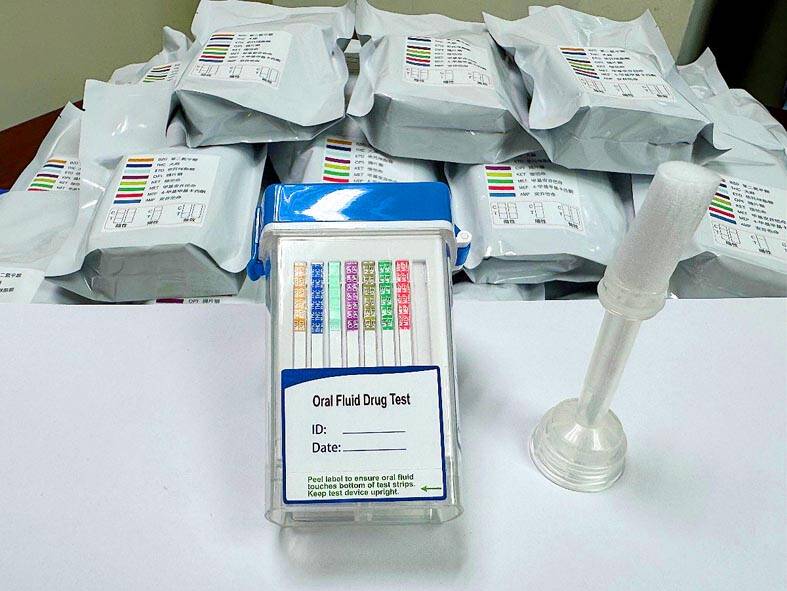People suspected of drug-impaired driving who refuse to take a rapid saliva test at a police checkpoint would face a fine of NT$180,000, the Ministry of Transportation and Communications said yesterday.
The updated Uniform Punishment Standard Forms and Rules for Handling Matters of Violating Road Traffic Regulations (違反道路交通管理事件統一裁罰標準及處理細則), which took effect on Wednesday, require the entire testing process to be recorded by police.
Tests are to be administered on-site at a checkpoint, although officers can direct the suspect to a police station or another suitable location if needed.

Photo copied by Cheng Ching-yi, Taipei Times
Under the new rules, officers must inform the suspect of the testing procedure, the kit’s expiration date, how the results are interpreted and the valid time window for reading the results.
If a test fails due to a kit malfunction or because the suspect does not follow the procedure, officers must explain the reason and ask them to retake it.
After the test, the officer must inform the driver of the result and request a signature on the enforcement record form.
If they refuse to sign, the reason must be documented, the ministry said.
The updates provide clearer procedures for officers and enhance the regulations’ legal basis, it said.
The revisions align with the Criminal Investigation Bureau’s (CIB) plan, announced in late September, to fully introduce rapid saliva drug tests capable of detecting drug residues in about three minutes.
The bureau previously said the move follows practices in several countries and aims to curb rising drug-driving incidents.
Drivers who refuse testing must be informed of the legal consequences, which include a NT$180,000 fine, revocation of their driver’s license and a two-year suspension of their vehicle license plate.
If the refusal occurs in a case involving serious injury or death, the vehicle can also be seized.
Repeat offenders within 10 years face a heavier fine of NT$360,000 for refusing a saliva test.
For operators of slow-moving vehicles, including scooter, motorcycle or bicycle riders, the fine is NT$4,800 for refusal. For those riding light electric scooters, the vehicle would also be impounded.

Taiwan is gearing up to celebrate the New Year at events across the country, headlined by the annual countdown and Taipei 101 fireworks display at midnight. Many of the events are to be livesteamed online. See below for lineups and links: Taipei Taipei’s New Year’s Party 2026 is to begin at 7pm and run until 1am, with the theme “Sailing to the Future.” South Korean girl group KARA is headlining the concert at Taipei City Hall Plaza, with additional performances by Amber An (安心亞), Nick Chou (周湯豪), hip-hop trio Nine One One (玖壹壹), Bii (畢書盡), girl group Genblue (幻藍小熊) and more. The festivities are to

Auckland rang in 2026 with a downtown fireworks display launched from New Zealand’s tallest structure, Sky Tower, making it the first major city to greet the new year at a celebration dampened by rain, while crowds in Taipei braved the elements to watch Taipei 101’s display. South Pacific countries are the first to bid farewell to 2025. Clocks struck midnight in Auckland, with a population of 1.7 million, 18 hours before the famous ball was to drop in New York’s Times Square. The five-minute display involved 3,500 fireworks launched from the 240m Sky Tower. Smaller community events were canceled across New Zealand’s

AFTERMATH: The Taipei City Government said it received 39 minor incident reports including gas leaks, water leaks and outages, and a damaged traffic signal A magnitude 7.0 earthquake struck off Taiwan’s northeastern coast late on Saturday, producing only two major aftershocks as of yesterday noon, the Central Weather Administration (CWA) said. The limited aftershocks contrast with last year’s major earthquake in Hualien County, as Saturday’s earthquake occurred at a greater depth in a subduction zone. Saturday’s earthquake struck at 11:05pm, with its hypocenter about 32.3km east of Yilan County Hall, at a depth of 72.8km. Shaking was felt in 17 administrative regions north of Tainan and in eastern Taiwan, reaching intensity level 4 on Taiwan’s seven-tier seismic scale, the CWA said. In Hualien, the

‘IRRESPONSIBLE’: Beijing’s constant disruption of the ‘status quo’ in the Taiwan Strait has damaged peace, stability and security in the Indo-Pacific region, MOFA said The Presidential Office yesterday condemned China’s launch of another military drill around Taiwan, saying such actions are a “unilateral provocation” that destabilizes regional peace and stability. China should immediately stop the irresponsible and provocative actions, Presidential Office spokeswoman Karen Kuo (郭雅慧) said, after the Chinese People’s Liberation Army (PLA) yesterday announced the start of a new round of joint exercises around Taiwan by the army, navy and air force, which it said were approaching “from different directions.” Code-named “Justice Mission 2025,” the exercises would be conducted in the Taiwan Strait and in areas north, southwest, southeast and east of Taiwan